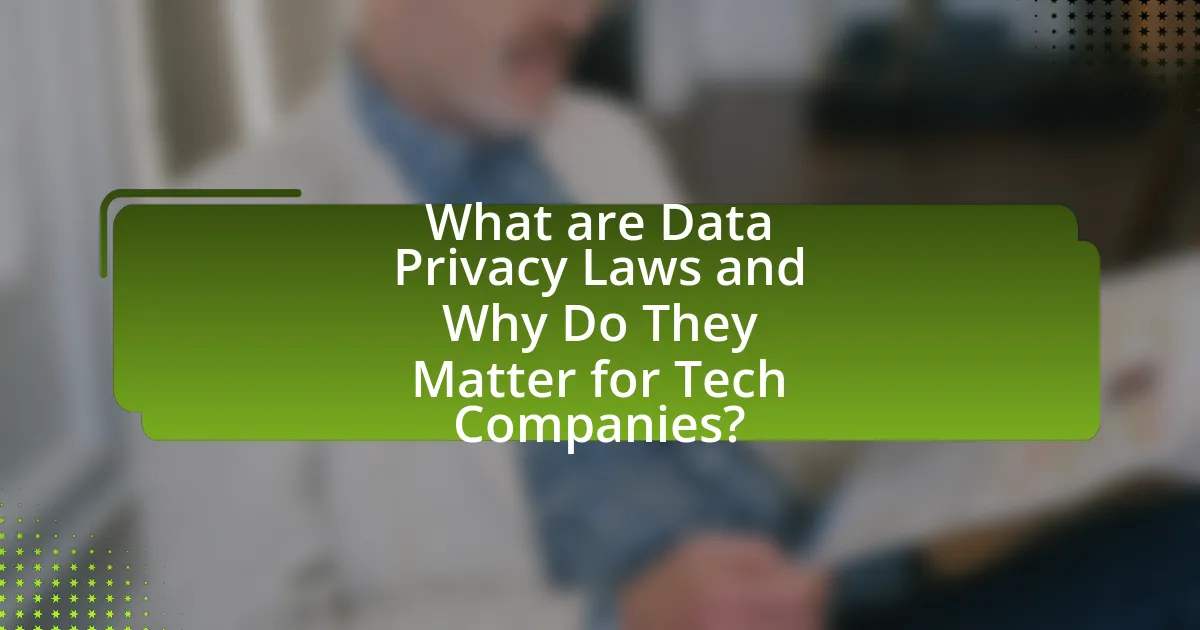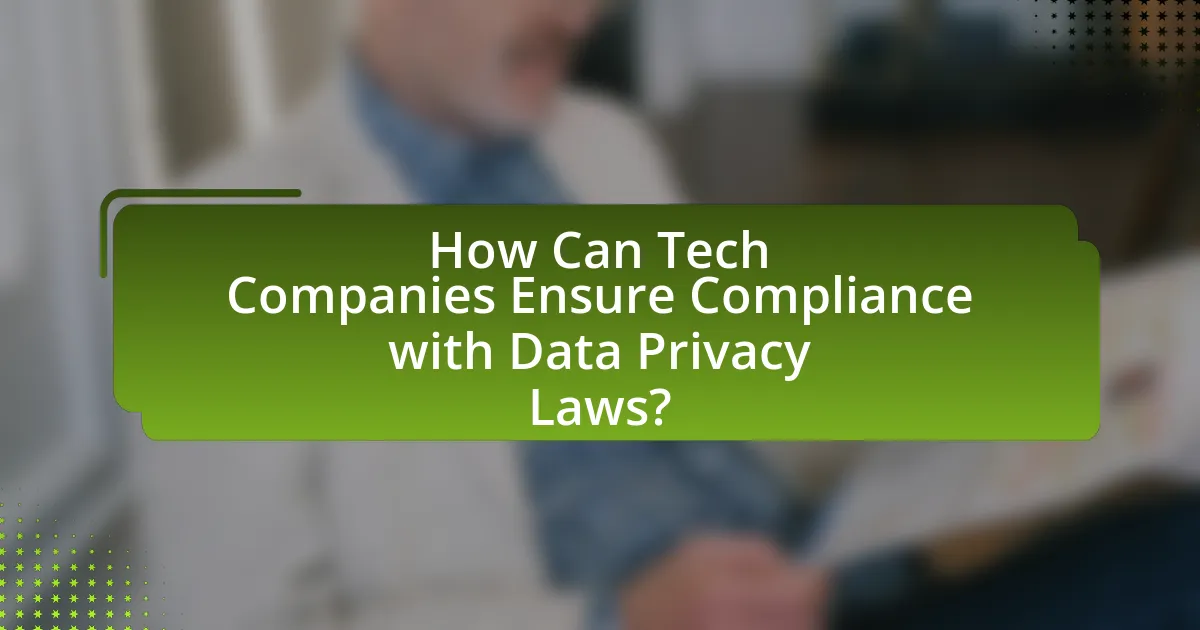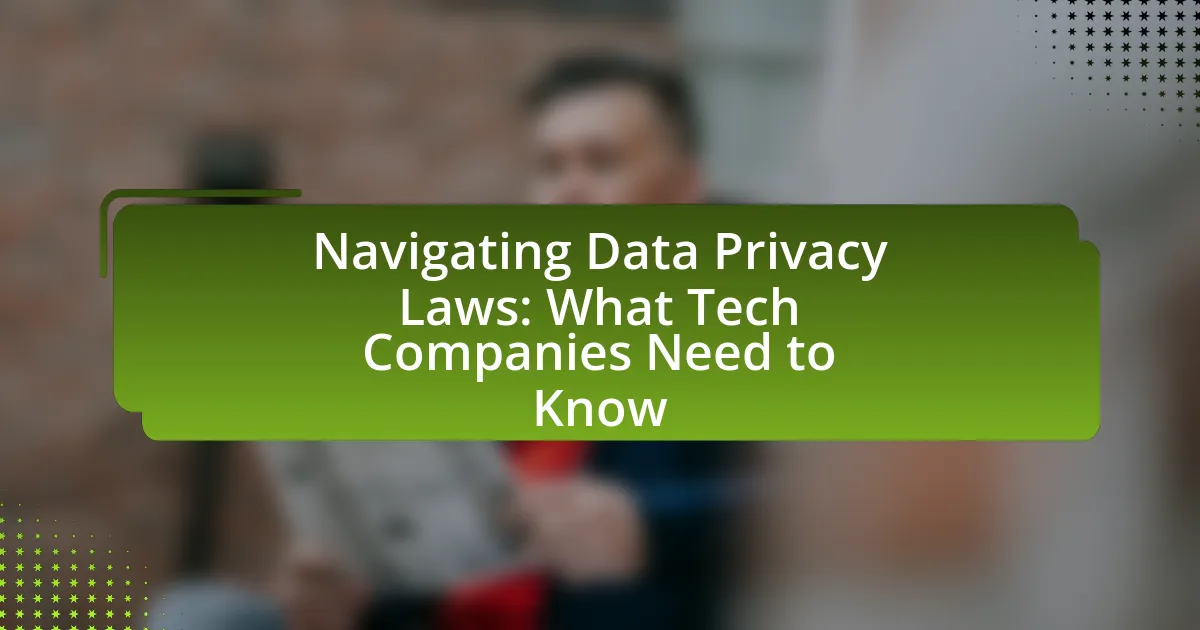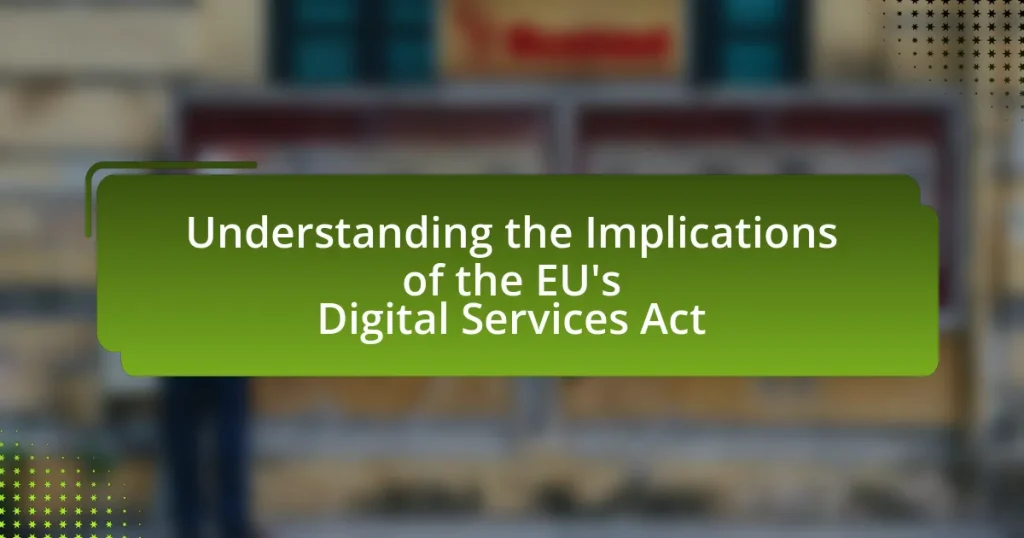Data privacy laws are essential regulations that govern how tech companies collect, store, and use personal information, with significant implications for consumer trust and legal compliance. This article explores the varying data privacy laws across regions, such as the General Data Protection Regulation (GDPR) in the EU and the California Consumer Privacy Act (CCPA) in the U.S., highlighting their key differences and the cultural attitudes that shape them. It also addresses the consequences of non-compliance, including financial penalties and reputational damage, while outlining best practices for tech companies to ensure adherence to these laws, such as conducting regular audits, implementing strong data protection measures, and fostering a culture of privacy within their organizations.

What are Data Privacy Laws and Why Do They Matter for Tech Companies?
Data privacy laws are regulations that govern the collection, storage, and use of personal information by organizations, including tech companies. These laws matter for tech companies because they establish legal frameworks that protect consumer data, ensuring that companies handle personal information responsibly and transparently. For instance, the General Data Protection Regulation (GDPR) in the European Union imposes strict requirements on data handling, with penalties for non-compliance reaching up to 4% of a company’s global revenue. Compliance with data privacy laws not only mitigates legal risks but also builds consumer trust, which is essential for maintaining a competitive edge in the technology sector.
How do Data Privacy Laws vary across different regions?
Data privacy laws vary significantly across different regions, reflecting diverse cultural, legal, and economic contexts. For instance, the European Union’s General Data Protection Regulation (GDPR) imposes strict requirements on data handling and grants individuals extensive rights over their personal data, including the right to access and delete information. In contrast, the United States employs a more fragmented approach, with laws like the California Consumer Privacy Act (CCPA) providing specific protections but lacking a comprehensive federal framework. Additionally, countries like Brazil have enacted their own regulations, such as the Lei Geral de Proteção de Dados (LGPD), which aligns closely with the GDPR but is tailored to Brazilian legal standards. These variations highlight the necessity for tech companies to adapt their data practices according to the specific legal requirements of each region they operate in.
What are the key differences between GDPR, CCPA, and other regulations?
The key differences between GDPR, CCPA, and other regulations lie in their scope, rights granted to individuals, and enforcement mechanisms. GDPR, implemented in the European Union, applies to all organizations processing personal data of EU residents, granting extensive rights such as data portability and the right to be forgotten. In contrast, CCPA, applicable in California, focuses on consumer rights related to personal information, including the right to know what data is collected and the right to opt-out of data sales, but does not provide as comprehensive a framework as GDPR. Other regulations, like Brazil’s LGPD, share similarities with GDPR but have unique provisions tailored to local contexts, such as different penalties and definitions of personal data. These distinctions highlight the varying approaches to data privacy across jurisdictions, impacting compliance strategies for tech companies operating internationally.
How do cultural attitudes towards privacy influence these laws?
Cultural attitudes towards privacy significantly influence data privacy laws by shaping the expectations and norms surrounding individual rights and data protection. For instance, in countries like Germany, a strong emphasis on personal privacy stems from historical contexts, such as the impact of totalitarian regimes, leading to stringent laws like the Federal Data Protection Act. Conversely, in the United States, a more individualistic culture prioritizes innovation and economic growth, resulting in a fragmented legal landscape where privacy laws vary by state, such as the California Consumer Privacy Act. These cultural perspectives directly affect how laws are formulated, enforced, and perceived, reflecting societal values regarding the balance between privacy and other interests like security and commerce.
What are the potential consequences of non-compliance?
The potential consequences of non-compliance with data privacy laws include significant financial penalties, legal repercussions, and reputational damage. For instance, the General Data Protection Regulation (GDPR) can impose fines of up to 4% of a company’s global annual revenue or €20 million, whichever is higher, for violations. Additionally, companies may face lawsuits from affected individuals or regulatory bodies, leading to costly legal battles. Reputational damage can result in loss of customer trust and decreased market share, as consumers increasingly prioritize data privacy. These consequences underscore the importance of adhering to data privacy regulations for tech companies.
What fines and penalties can tech companies face?
Tech companies can face substantial fines and penalties for violations of data privacy laws, which can range from monetary fines to operational restrictions. For instance, under the General Data Protection Regulation (GDPR) in the European Union, companies can incur fines up to €20 million or 4% of their global annual revenue, whichever is higher, for non-compliance. Similarly, the California Consumer Privacy Act (CCPA) imposes fines of up to $7,500 per violation, with potential for additional penalties if violations are not addressed within a specified timeframe. These regulations underscore the financial risks associated with inadequate data protection practices, emphasizing the importance of compliance for tech companies.
How can non-compliance affect a company’s reputation?
Non-compliance can severely damage a company’s reputation by eroding trust among customers and stakeholders. When a company fails to adhere to data privacy laws, it risks public backlash, which can lead to negative media coverage and loss of customer loyalty. For instance, the 2018 Facebook-Cambridge Analytica scandal resulted in significant reputational harm for Facebook, leading to a decline in user trust and a drop in stock prices. Additionally, companies may face legal penalties and regulatory scrutiny, further compounding reputational damage. According to a 2020 study by the Ponemon Institute, organizations that experience data breaches due to non-compliance can see a 3.5% decrease in customer retention, highlighting the direct impact on reputation.
What are the fundamental principles of Data Privacy Laws?
The fundamental principles of Data Privacy Laws include transparency, purpose limitation, data minimization, accuracy, storage limitation, integrity and confidentiality, and accountability. Transparency requires organizations to inform individuals about data collection and usage. Purpose limitation mandates that data should only be collected for specified, legitimate purposes. Data minimization emphasizes collecting only the data necessary for those purposes. Accuracy ensures that personal data is kept up to date and correct. Storage limitation restricts data retention to the time necessary for processing. Integrity and confidentiality require appropriate security measures to protect data. Lastly, accountability holds organizations responsible for complying with these principles, as seen in regulations like the General Data Protection Regulation (GDPR), which enforces strict compliance and penalties for violations.
What does consent mean in the context of data privacy?
Consent in the context of data privacy refers to the explicit agreement by individuals to allow their personal data to be collected, processed, and used by organizations. This agreement must be informed, meaning individuals should understand what data is being collected, how it will be used, and the potential risks involved. Legal frameworks such as the General Data Protection Regulation (GDPR) emphasize that consent must be freely given, specific, informed, and unambiguous, requiring clear affirmative action from the individual. This ensures that organizations respect individuals’ autonomy and privacy rights, aligning with the principles of transparency and accountability in data handling.
How is data minimization applied in practice?
Data minimization is applied in practice by collecting only the data necessary for a specific purpose and limiting access to that data. For instance, companies often implement data collection policies that specify the exact types of information required for services, such as only requesting essential user details during account creation. This approach aligns with regulations like the General Data Protection Regulation (GDPR), which mandates that organizations must not retain personal data longer than necessary for its intended purpose. Additionally, organizations may utilize techniques such as data anonymization and pseudonymization to further reduce the risk of identifying individuals while still allowing for data analysis.

How Can Tech Companies Ensure Compliance with Data Privacy Laws?
Tech companies can ensure compliance with data privacy laws by implementing robust data governance frameworks that include regular audits, employee training, and clear data handling policies. These frameworks help organizations identify and mitigate risks associated with data processing activities. For instance, the General Data Protection Regulation (GDPR) mandates that companies conduct Data Protection Impact Assessments (DPIAs) to evaluate risks to personal data. Additionally, tech companies should establish transparent privacy notices and obtain explicit consent from users before collecting their data, as required by laws like the California Consumer Privacy Act (CCPA). Regularly updating privacy policies and practices in response to evolving regulations further reinforces compliance efforts.
What steps should companies take to assess their current compliance status?
Companies should conduct a comprehensive compliance audit to assess their current compliance status. This involves reviewing existing policies, procedures, and practices against applicable data privacy laws and regulations, such as the General Data Protection Regulation (GDPR) and the California Consumer Privacy Act (CCPA). Additionally, companies should identify any gaps in compliance by evaluating data handling practices, employee training, and incident response protocols. Regular assessments, including risk assessments and internal audits, can provide insights into compliance effectiveness and areas needing improvement. According to a 2021 report by the International Association of Privacy Professionals, organizations that regularly audit their compliance are 30% more likely to identify and mitigate compliance risks effectively.
How can a data audit help identify compliance gaps?
A data audit can help identify compliance gaps by systematically reviewing data management practices against regulatory requirements. This process involves evaluating data collection, storage, processing, and sharing practices to ensure they align with laws such as GDPR or CCPA. For instance, a 2020 study by the International Association of Privacy Professionals found that organizations conducting regular data audits were 30% more likely to identify compliance issues early, allowing for timely remediation. By pinpointing areas where data handling may not meet legal standards, a data audit serves as a critical tool for organizations to mitigate risks and enhance compliance.
What role does employee training play in compliance efforts?
Employee training is essential in compliance efforts as it equips staff with the knowledge and skills necessary to adhere to data privacy laws and regulations. Effective training programs ensure that employees understand their responsibilities regarding data handling, recognize potential compliance risks, and are aware of the consequences of non-compliance. For instance, a study by the Ponemon Institute found that organizations with comprehensive security awareness training programs experienced 50% fewer data breaches compared to those without such training. This highlights the critical role that employee training plays in fostering a culture of compliance and reducing the likelihood of violations in the context of data privacy laws.
What tools and technologies can assist in maintaining compliance?
Tools and technologies that assist in maintaining compliance include compliance management software, data encryption tools, and audit management systems. Compliance management software, such as LogicGate or ComplyAdvantage, helps organizations track regulatory requirements and manage compliance workflows efficiently. Data encryption tools, like VeraCrypt or BitLocker, protect sensitive information by ensuring that data is unreadable without proper authorization. Audit management systems, such as AuditBoard or Netwrix, facilitate the auditing process by automating data collection and reporting, ensuring that organizations can demonstrate compliance with relevant laws and regulations. These tools collectively enhance an organization’s ability to adhere to data privacy laws and maintain compliance effectively.
How can data encryption enhance data protection?
Data encryption enhances data protection by converting sensitive information into a coded format that is unreadable without the appropriate decryption key. This process safeguards data from unauthorized access, ensuring that even if data is intercepted or accessed by malicious actors, it remains secure and unintelligible. According to a study by the Ponemon Institute, organizations that implement encryption experience 50% fewer data breaches compared to those that do not. This statistic underscores the effectiveness of encryption in mitigating risks associated with data exposure and compliance with data privacy laws.
What are the benefits of using privacy management software?
Privacy management software enhances data protection by ensuring compliance with data privacy laws, such as GDPR and CCPA. This software automates the process of tracking data usage, managing consent, and facilitating data subject requests, which reduces the risk of legal penalties. According to a report by the International Association of Privacy Professionals, organizations using privacy management tools can decrease compliance costs by up to 30% and improve their ability to respond to regulatory changes swiftly. Additionally, it fosters consumer trust by demonstrating a commitment to safeguarding personal information, which can lead to increased customer loyalty and brand reputation.

What Best Practices Should Tech Companies Follow for Data Privacy?
Tech companies should implement robust data encryption, conduct regular security audits, and ensure compliance with relevant data protection regulations to safeguard user information. Data encryption protects sensitive information from unauthorized access, while regular security audits help identify vulnerabilities in systems. Compliance with regulations such as the General Data Protection Regulation (GDPR) and the California Consumer Privacy Act (CCPA) ensures that companies adhere to legal standards for data privacy, thereby reducing the risk of legal penalties and enhancing consumer trust.
How can companies create a culture of privacy within their organization?
Companies can create a culture of privacy by implementing comprehensive data protection policies and fostering employee awareness. Establishing clear guidelines on data handling, regular training sessions, and promoting open discussions about privacy concerns can significantly enhance understanding and compliance among staff. Research indicates that organizations with robust privacy training programs experience a 50% reduction in data breaches, highlighting the effectiveness of education in cultivating a privacy-centric environment.
What policies should be implemented to promote data privacy?
To promote data privacy, comprehensive data protection regulations should be implemented, including strict consent requirements, data minimization principles, and robust enforcement mechanisms. These policies ensure that individuals have control over their personal information, requiring organizations to obtain explicit consent before collecting or processing data. Data minimization mandates that only necessary information is collected, reducing the risk of exposure. Furthermore, enforcement mechanisms, such as penalties for non-compliance, incentivize adherence to these regulations. For instance, the General Data Protection Regulation (GDPR) in the European Union has set a precedent by imposing significant fines for violations, thereby reinforcing the importance of data privacy.
How can leadership commitment influence data privacy practices?
Leadership commitment significantly influences data privacy practices by establishing a culture of accountability and prioritization of privacy within an organization. When leaders actively endorse and implement robust data privacy policies, it sets a precedent for all employees, fostering a workplace environment where data protection is valued. Research indicates that organizations with strong leadership support for data privacy are more likely to comply with regulations and effectively mitigate risks associated with data breaches. For instance, a study by the Ponemon Institute found that companies with a dedicated privacy leader experienced 30% fewer data breaches compared to those without such commitment. This demonstrates that leadership engagement is crucial for enhancing data privacy practices and ensuring compliance with evolving data protection laws.
What are the common pitfalls to avoid in data privacy compliance?
Common pitfalls to avoid in data privacy compliance include inadequate data mapping, failure to conduct regular risk assessments, and neglecting employee training. Inadequate data mapping can lead to a lack of understanding of what personal data is collected and processed, which is essential for compliance with regulations like GDPR. Regular risk assessments are crucial as they help identify vulnerabilities and ensure that data protection measures are effective; neglecting this can result in non-compliance and potential fines. Additionally, without proper employee training on data privacy policies and practices, organizations risk unintentional breaches and mishandling of sensitive information, which can severely impact compliance efforts.
How can companies prevent data breaches and leaks?
Companies can prevent data breaches and leaks by implementing robust cybersecurity measures, including encryption, regular software updates, and employee training. Encryption protects sensitive data by making it unreadable to unauthorized users, while regular software updates patch vulnerabilities that could be exploited by attackers. Employee training raises awareness about phishing and other social engineering tactics, reducing the likelihood of human error leading to a breach. According to a 2021 report by IBM, organizations that invest in comprehensive security training can reduce the risk of a data breach by up to 70%.
What mistakes do companies often make when interpreting data privacy laws?
Companies often make the mistake of underestimating the complexity and variability of data privacy laws across different jurisdictions. This oversight can lead to non-compliance, as laws like the General Data Protection Regulation (GDPR) in Europe impose strict requirements that differ significantly from regulations in other regions, such as the California Consumer Privacy Act (CCPA). Additionally, companies frequently misinterpret the scope of consent required for data processing, assuming that blanket consent suffices when, in fact, specific and informed consent is often mandated. Furthermore, many organizations fail to implement adequate data protection measures, neglecting to conduct regular audits or risk assessments, which are essential for identifying vulnerabilities and ensuring compliance. These mistakes can result in substantial fines and reputational damage, as evidenced by the over €1.5 billion in fines issued under GDPR since its enforcement in 2018.
What practical tips can tech companies implement for effective data privacy management?
Tech companies can implement several practical tips for effective data privacy management, including conducting regular data audits, implementing strong encryption methods, and ensuring compliance with relevant data protection regulations. Regular data audits help identify vulnerabilities and ensure that data handling practices align with legal requirements, such as the General Data Protection Regulation (GDPR), which mandates transparency and accountability in data processing. Strong encryption methods protect sensitive information from unauthorized access, as evidenced by studies showing that encryption can significantly reduce the risk of data breaches. Additionally, training employees on data privacy policies fosters a culture of awareness and responsibility, which is crucial for maintaining data integrity and compliance.



